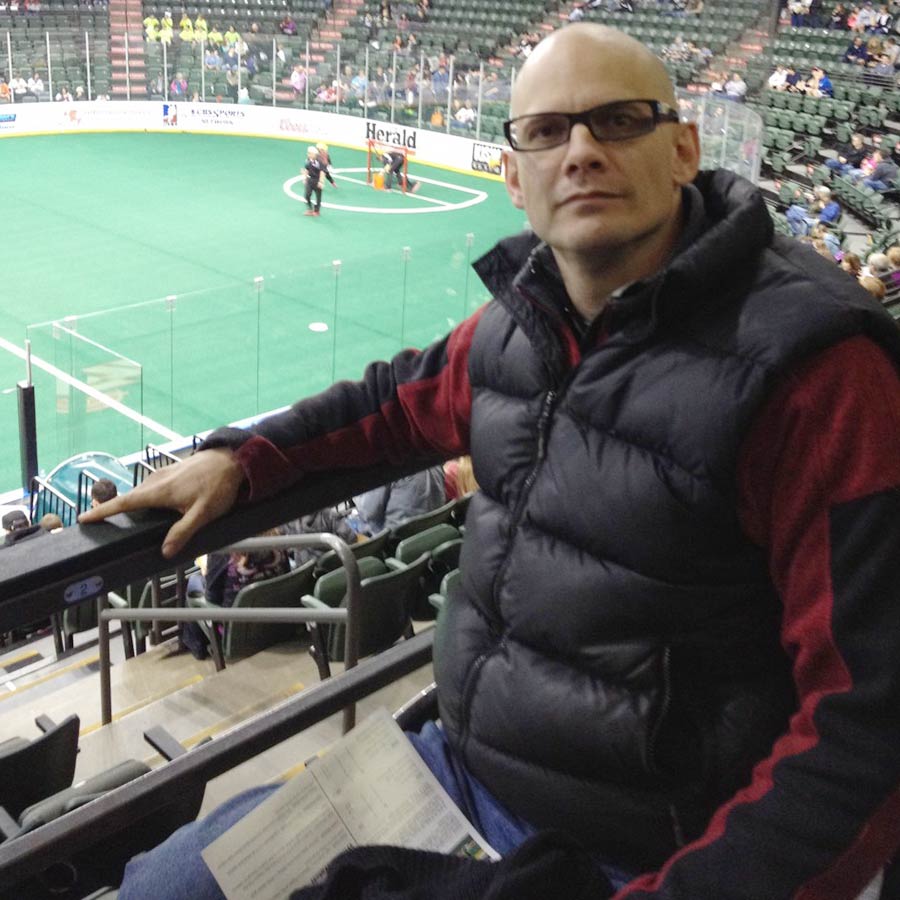It was short-lived. In 1989, I was playing an off-season college game. I shifted direction suddenly. My left knee buckled. I heard that ominious snap that generally signifies a torn ligament. The trainer quickly pronounced a torn Anterior Cruciate Ligament, a career-ending injury. At the time, I figured I was done for the year, maybe forever.

Mine was repaired. I tried to build up my strength. I used a brace. I did my exercises. But I had more and more trouble running. I wasn’t getting better. My legs felt heavy. My balance was horrible. I never asked for help, even though I sensed something was wrong. It was disappointing, puzzling even. But I wasn’t done with the sport. I coached at a prep school in the Berkshires after college. Gloriously sunny autumn days. Students improving with patient encouragement. The cohesiveness of the team. That all worked. I substituted my knowledge of the game for prowess on the field. I taught tactics and sportsmanship. But my body was failing me
My bad knee provided a reason for a slow, steady reduction in my activity level. Organized sports were out. Skiing became impossible, especially cross-country. I blamed my lack of coordination on my inconsistent approach to physical therapy. I went into protection mode. That meant curtailing most outdoor activities. Even hiking was a chore and, after a few years, my walking was labored, too. “What’s wrong with me,” I wondered, though never aloud. Soon other people began to ask, too. But I’m a master at deflection.
Seven years later, after a visit to my new home on the West Coast, my father insisted that my irregular gait was something more than an old sports injury. That observation and the dizzying round of visits to specialists that followed changed my life. I was right. My father was right. Something was wrong. I had Adrenomyeloneuropathy, a neurological disorder. I had little idea of how this condition would come to shape my life, especially my life as an athlete. That’s how I still saw myself: kinetic and fast and anticipatory.
After my diagnosis, I felt so very far removed from sports; that is, able-bodied sports. I struggled to see a way to be involved. I struggled to adjust to using crutches and, eventually, a wheelchair to negotiate my world. But I wanted to stay involved. Could I be a coach? The logistics seemed impossible. How could I maneuver a muddy field to make a point or demonstrate a technique? How do coaches in wheelchairs manage it? There were no examples in my life, no obvious examples out there. It hurt less to curtail this yearning to be back on the field. So I gave up.
And then I went to see the Washington Stealth this Sunday, part of the national indoor lacrosse league. I’m a bit of a sports fanatic, but in a less-machismo, more-intellectual way than the average American male. Being bi-coastal, I watch the Red Sox and the Mariners, the Patriots and the Seahawks. I live only blocks away from the Seattle stadiums. But this event provided something different. I could see myself back out there playing box lacrosse. I could feel those picks and passes. I could predict the play. I knew when the shot was true, the pass perfect. I wondered about a way to stay involved. The longing returned. It’s early days, yet, but I can imagine relearning this game as a wheelchair user. I picture promoting and recruiting others like me. Together we might be able to field a team, even create a league here. It won’t be the same. But it also won’t be a consolation prize. It will be what it is. The thrill of connection. The power of skill. The opportunity to advance. Legs or wheels, now my means of locomotion doesn’t really matter. It’s the game that counts. And playing it.

Great piece – keep on writing and mix it up: some in “the No Pity” theme others in sports. Send your stuff out, please, there’s gotta be a discerning editor out there for you. Well done, Randy.
Sterling, you’re my most thoughtful reader-cheerleader. Right now, blogging seems to be all about practice: getting my swings right, understanding the rules, and trying to make the best pitch. One day I hope to be ready for the major leagues.
Good glove in the field and the hits will come, Randy Ringer!
Hi Randy – thinking of you at UW right now – hoping and praying for the best – I look forward to helping you create the WA wheel chair league! And don’t forget – u owe me some lacrosse lessons!
I’m building my strength to make good on those promises
Here in Whitby, Ontario, a wheelchair lacrosse league has been started with the help of former NLL players
I read the same about the wheelchair lacrosse teams in Virginia and in California. I think First nations teams in Canada have also helped out. I am amazed at all the Canadian players in the Box Lacrosse here in the States. I am thrilled with the support I have been given personally and for the idea of getting a team started here in Seattle. Best Wishes. Thanks for the comment.
Randy